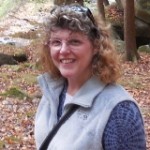7/1/14
Besides hearing from eye care professionals and Discovery Eye Foundation staff, we also think it is important to hear from people with sight threatening eye diseases such as age-related macular degeneration, keratoconus, retinitis pigmentosa, etc. They can share their experiences with others that are newly diagnosed with eye disease, while providing insights to family members, friends and caregivers. What follows is the first of these occasional posts focusing on the experiences and insights gained from vision loss.
“The expression on my optometrist’s face was as if he was giving me a cancer sentence,” Jeanette Hasseman remembers. “I had never heard of keratoconus, but he told me it was an incurable vision disability. He said he was aware of some evolving technology, but he wanted to give me some time to absorb and research the disease.

“When I went back three months later, he told me a about a cross-linking study that was going on not-too-far from here, but I hadn’t fully absorbed all the information I was reading yet,” she recalls. I did not understand — even though it was plainly stated in the information I was looking at — that once you lose some vision, you don’t get it back.
“I kept thinking, ‘OK, this certainly can be fixed,” so instead of getting cross-linking in July, I waited until December. I regret not acting on my doctor’s suggestion of getting in the study in July, because I lost a tremendous amount of vision by December.”
Hasseman was tested and qualified for the clinical trial in December and had epi-on cross-linking in both eyes in January 2013. “The topography scans show the KC progression has been halted,” she says. “I rejoice in that.”
While her vision seemed better shortly after the procedures, she was diagnosed one week after crosslinking with a “gouge” (4 mm corneal abrasion) in her left cornea that resulted in severe hazing. While the severity of the corneal hazing has decreased in the past year, she is waiting to find out if it is permanent. If so, she may need to have a corneal transplant at some point to restore any visual acuity.
A registered nurse, Hasseman finished her BSN degree two years ago at age 54 — just months before she was diagnosed with KC. The native Ohioan has since stopped working as a nurse, and more recently, she had to give up teaching and doing tatting — lace-making — a hobby she had enjoyed for decades.
Hasseman found the National Keratoconus Foundation (NKCF) when she first Googled “kerotoconus.” “KC-Link has been a great blessing,” she says. “I’ve downloaded information; I signed up for KC-Link and asked questions of Catherine [Warren, director of NKCF] and the moderating doctors. I found great support for my own spirit, as well as information on the latest technologies.
“When people ask questions on KC-Link, if I can relate, I answer. Just the other day, someone who was just diagnosed asked, ‘Well, what should I do?’ I wrote: ‘First thing is: Breathe. Second thing is: Ask for information from your eye doctor and ask who is the best corneal specialist in your area who is really good for keratoconus. Most of all: Be patient.’
“It’s really hard to lose your vision. Even in your own heart, you can feel isolated. KC-Link gives you a body of other people who totally understand what you’re thinking, what you’re feeling, what frustrates you. There is so much advice you can get on KC-Link regarding contacts, how to keep eyes moist, how to handle low-light driving, what type of e-reader works best for people with keratoconus — you cannot exhaust the information that is shared; you cannot exhaust the different emotions that are shared.”
 Jeanette Hasseman
Jeanette Hasseman
Keratoconus Advocate

